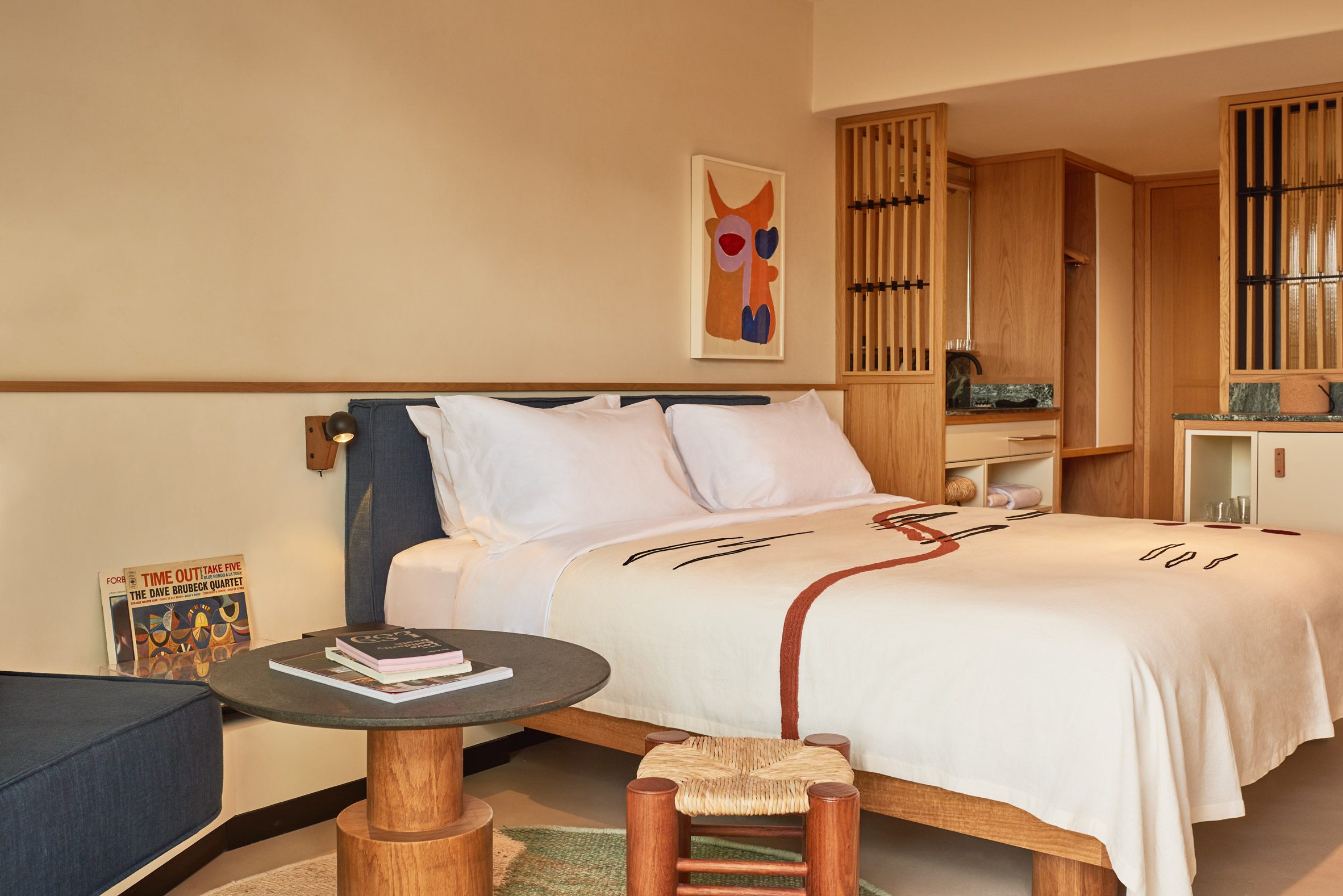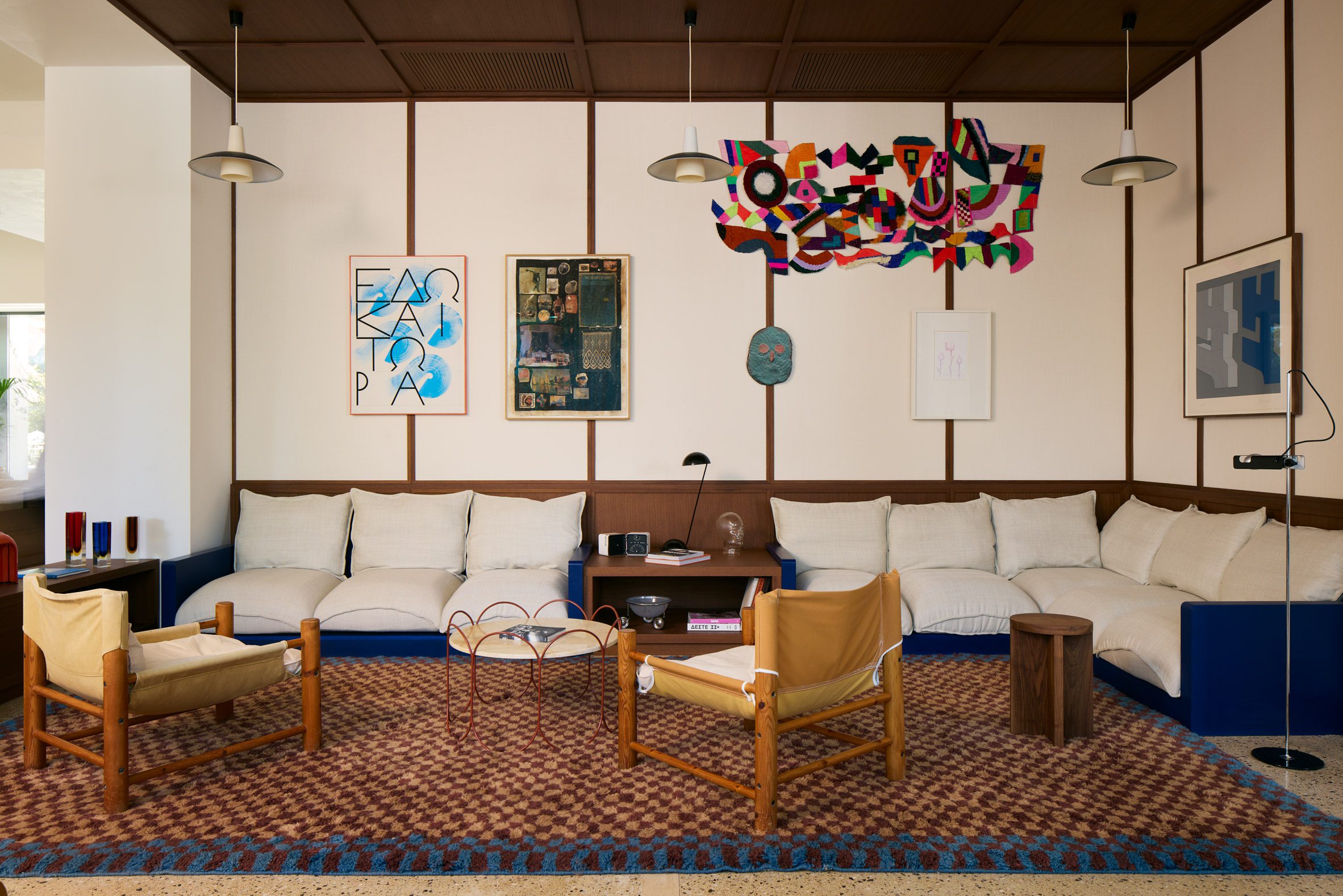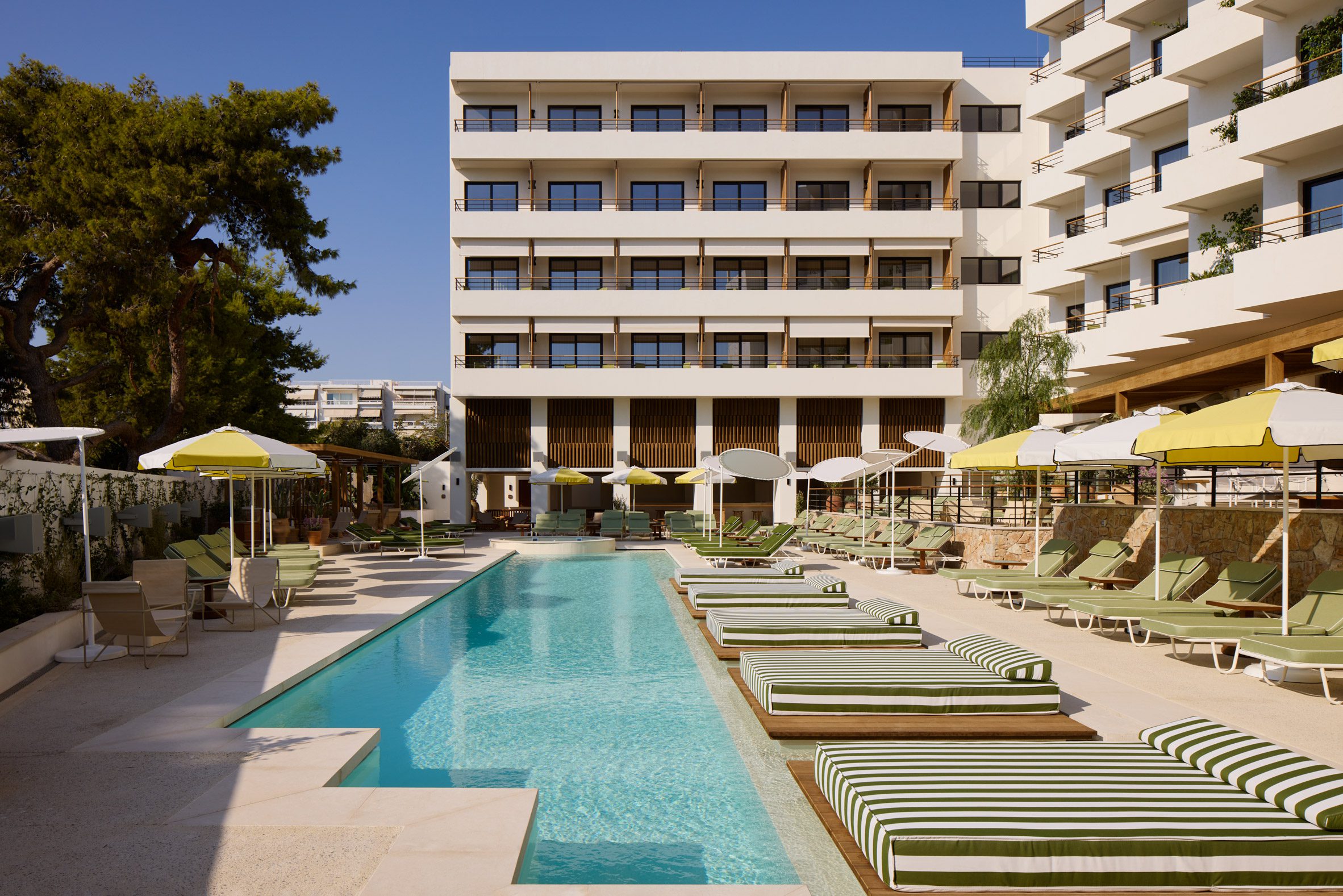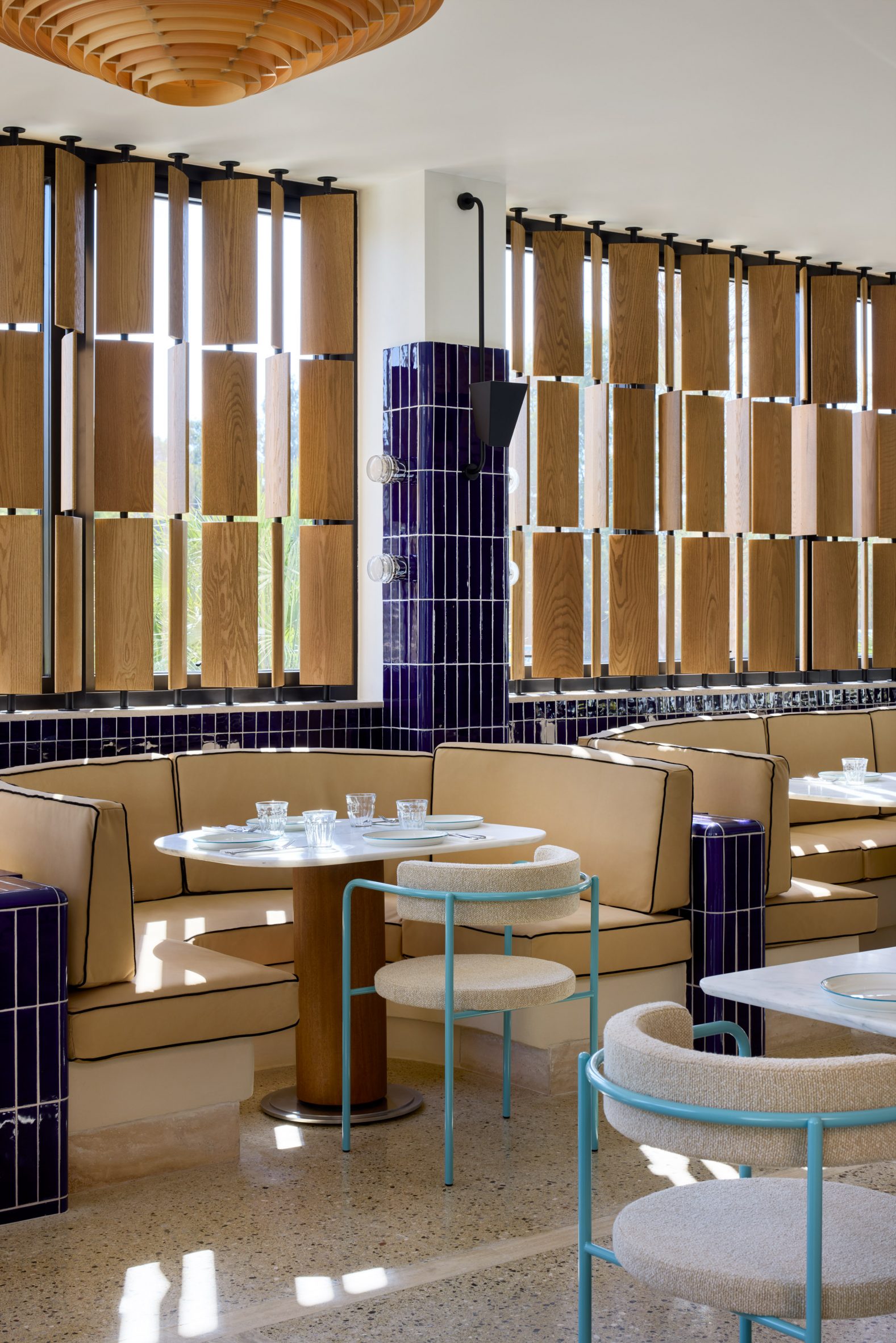"좋은 건축은 기능성과 미학, 그리고 사용자 경험의 절묘한 균형이다." – 알바 알토

 |
 |
 |
그리스 모더니즘과 빈티지 감성의 만남, Ciguë designs art-filled Ace Hotel in brutalist building on Athens Riviera
Ace Hotel Athens는 아테네 리비에라의 글리파다 지역에 위치한 120개의 객실을 갖춘 호텔로, 1975년에 지어진 Fenix Hotel의 구조를 보존하면서 현대적인 감각으로 새롭게 설계되었습니다. 이 프로젝트는 프랑스 건축 스튜디오 Ciguë가 맡아 그리스 모더니즘과 1970년대 해안 리조트의 매력을 조화롭게 결합한 디자인을 선보였습니다. Ace Hotel Athens는 과거와 현재의 건축 언어를 연결하며, 아테네 리비에라 시대의 여유로움과 우아함을 현대적으로 재해석하고자 하는 설계 의도를 담고 있습니다.
프로젝트 개요
프로젝트명: Ace Hotel Athens
설계자: 프랑스 스튜디오 Ciguë
위치: 아테네 리비에라 지역, 구 Fenix Hotel 자리
이 프로젝트는 단순한 숙박 시설을 넘어서 아테네와 그리스 해안의 역사적, 문화적 맥락을 반영한 공간으로, 과거와 현재를 이어주는 건축적 다리로서의 역할을 합니다.
설계 컨셉
핵심 개념: 호텔은 1970년대 아테네 리비에라의 우아함을 현대적인 감각으로 재구성한 공간입니다. 프랑스 스튜디오 Ciguë는 브루탈리스트 구조와 자연주의적 요소를 조화롭게 결합하여 호텔에 이중적인 매력을 부여했습니다.
영감: 그리스 모더니즘과 자연의 생동감을 바탕으로 한 이 디자인은 빈티지 감성의 가구와 현지 예술품을 배치하여 호텔의 독특한 개성을 강화합니다.
설계 컨셉의 구현
외부와의 연결성 강화: 호텔의 공공 공간은 지역 주민과 투숙객 모두가 사용할 수 있도록 개방되어 있으며, 거리와 수영장 사이의 시각적 흐름을 통해 자연스럽게 연결됩니다.
재료의 활용: 내부에는 샌디 톤의 테라조 바닥과 트래버틴 라인을 사용해 실내외 공간의 연속성을 강조했습니다. 외벽에는 하얀 석고와 나무 디테일이 조화롭게 사용되어, 브루탈리스트 구조의 강한 이미지가 부드럽게 중화됩니다.
주요 설계 요소
자연 통합: 외부 테라스와 수영장 주변에는 자갈과 녹지를 배치하여 자연 속에서 편안함을 느낄 수 있도록 설계되었습니다.
지속 가능성: 기존 건물의 구조를 보존하고 재활용함으로써 환경에 대한 책임을 반영한 지속 가능한 디자인을 구현했습니다. 또한, 구조적 개조와 강화 작업을 통해 안전성을 높이고, 친환경 재료와 에너지 효율 기술을 적용하여 지속 가능한 공간을 만들어냈습니다.
예술적 접근: 현지 예술가들의 작품과 1960~70년대 빈티지 가구를 호텔 곳곳에 배치하여 공간에 독창성과 개성을 더했습니다. 이러한 선택은 호텔이 지역 문화와 예술을 존중하고 있음을 나타냅니다.
내부 및 외부 디자인
내부 디자인: 샌디 톤의 테라조 바닥과 트래버틴 라인을 통해 실내외 공간의 연속성을 강조하였습니다. Sebastian 레스토랑에는 딥블루 세라믹 타일을 사용하여 시각적 포인트를 제공하며, 예술 작품과 조화를 이루어 공간의 깊이를 더합니다.
외부 디자인: 다수의 작은 발코니로 구성된 건물 외관은 화이트 톤과 나무 포인트, 그리고 녹색 식물로 부드럽게 재해석되었습니다. 이를 통해 강한 브루탈리스트 구조가 현대적이고 조화로운 이미지로 탈바꿈합니다.
글로벌 건축 트렌드와 비교 분석
Ace Hotel Athens는 지속 가능한 디자인과 지역 문화 존중이라는 현대 건축 트렌드를 반영하고 있습니다. 빈티지 가구와 자연 재료의 사용은 현대적이면서도 역사적 맥락을 담아내며, 호텔은 아테네 리비에라의 사회적, 문화적 배경을 현대적인 감각으로 반영하고 있습니다. 이로써 호텔은 과거와 현재를 잇는 상징적 공간으로 자리잡았습니다.
인사이트
전문가 의견: Ace Hotel Athens의 빈티지 디자인과 예술적 감각은 투숙객들에게 독특한 경험을 제공합니다. 지역성과 자연 친화적 디자인을 중시하는 이 공간은 앞으로 건축 디자인에서 지속 가능성과 문화적 가치의 중요성을 부각시키는 역할을 할 것입니다.
사용자 경험
거주자 의견: 호텔의 공공 공간과 수영장, 레스토랑은 투숙객뿐만 아니라 지역 주민에게도 개방되어 커뮤니티 공간으로 기능합니다. 수영장과 식사 공간은 가족 단위 여행자와 커플 등 다양한 사용자가 편리하게 이용할 수 있도록 설계되어, 사람들 간의 상호작용을 자연스럽게 유도합니다.
결론
요약: Ace Hotel Athens는 1970년대 아테네 리비에라의 여유로움을 현대적 감각으로 재해석한 공간으로, 빈티지 디자인과 로컬 예술 작품이 조화를 이루는 독창적인 공간입니다. 디자인의 비례와 균형은 전체 공간의 미적 완성도를 높이며, 각 예술 작품은 호텔에 특별한 개성을 부여합니다.
Write by ChatGPT & 5osa




















French studio Ciguë drew on Greek modernism when creating the interior of Ace Hotel and Swim Club Athens, which features vintage furniture and specially commissioned artworks by local artists.
Located in the old Fenix Hotel, a brutalist building notable for its jagged facade composed of multiple small balconies, the latest Ace Hotel has a pool and was intended to also function as a place where locals can come to swim and dine.
The 120-room hotel sits outside central Athens near the Glyfada suburb and the Ellinikon – an ongoing redevelopment of the former Athens airport into residential neighbourhoods with buildings planned by BIG and Foster + Partners.
Ciguë focused on evoking the history of the area when creating the hotel's interior.
"The idea was to create a new urban destination around that swim club concept and the revival of the existing building, anchored in the spirit of the 1970s Athenian Riviera era: relaxed elegance, natural vibrancy, Mediterranean sensuality," Ciguë founding partner Alphonse Sarthout told Dezeen.
"We could say this project is like a bridge between three cities, Athens, Glyfada and the future Ellinikon, and three eras and scenes: 1950s modernist architecture heritage, 70s Riviera pool and beach culture and the contemporary Athenian art scene."
The studio removed a number of 1980s and 90s interventions to showcase the bones of the building and made several changes to the layout, including turning the entire ground floor into one large public space and
"[We've] entirely redesigned the pool and its deck, opened and enlarged indoor spaces, creating transparencies from street to pool, and a new axis along its main facade – a wooden shaded walkway offering a new space between indoor and outdoor, where clients and locals can meet, giving the public access to the restaurant, the bar and the lobby," Sarthout said.
To create a sense of continuity between the interior and exterior, the studio used a sandy toned terrazzo in different finishes, structured by steps and travertine lines, for the flooring that extends onto the terrace.
The facade was clad in white plaster with wooden accents and greenery on the balconies to soften the brutalist appearance. Ciguë also added colourful accents in the form of artwork, furniture and deep blue ceramic tiles in the hotel's Sebastian restaurant.
The studio worked with local brand Back to the Future to find the 1960s and 70s furniture and accessories that decorate the main areas and the guest rooms.
"Like art pieces, vintage furniture is essential in every Ace Hotel," Sarthout said. "They show their love for design and designers, look for the richness of eclecticism, and trust the power of a well curated selection to give personality and a spirit to a place."
from dezeen